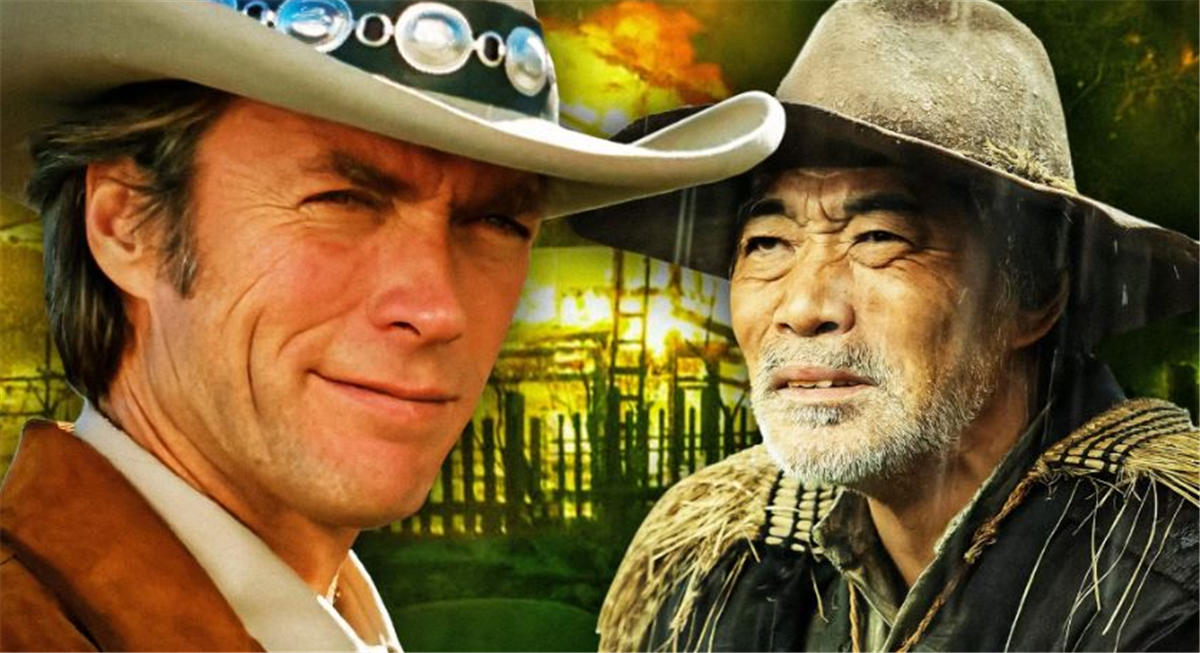Unforgiven is best known as a Clint Eastwood Western that became hugely popular in the 1990s, but perhaps lesser-known is the 2013 Japanese remake that cleverly adapts this story into a completely different genre, turning the iconic Western into an unforgettable Samurai adventure. The original film follows a retired gunfighter named William who’s pulled back into the game when a man brings him an offer that he simply can’t refuse – and when the fight gets personal, he’s all the way in. Unforgiven is one of the best Westerns of the 1990s, and it contributed strongly to the genre’s resurgence.
In 2013, Eastwood’s film was remade for Japanese audiences under the same name, though the story was very different. The film stars Ken Watanabe as protagonist Jubei Kamata, a retired samurai who joins his old associate to earn a hefty bounty following a string of vicious killings. The bones of the stories are the same, but Lee Sang-il’s adaptation takes place in a whole new setting with a fresh roster of characters to keep things new and interesting. Unforgiven may be Clint Eastwood’s best movie, but the remake proves that not everything has to remain the same to be excellent.
Unforgiven’s Japanese Remake Is A Great Take On The Original Western
It Makes Plenty Of Fun Changes

The decision to change certain aspects of Unforgiven while maintaining the foundations of the story is something that isn’t often seen in remakes of Hollywood movies, but director Lee Sang-il proves that there’s no reason it shouldn’t work. It’s much more interesting than simply copying and pasting the original film, which is something that’s seen time and time again with modern adaptations of classic movies. At least this approach gives the remake something unique to draw audiences into the project – in this case, it’s a completely different genre altogether.
Simply retelling Eastwood’s story in a modern setting wouldn’t have worked at all – not least because Eastwood’s film is pretty close to perfect already, but because there would be no reason for audiences to watch the new version. There needs to be a unique selling point that separates the remake from the original, and in the case of Unforgiven, Sang-il achieves that in a very smart way. He moves from cowboys to samurais, and while many of the values and concepts are the same, the details are entirely fresh. It even has some fights that rival even Eastwood’s best shootouts.
Which Version Of Unforgiven Is Better?
Does The Remake Live Up To Eastwood’s Original?
While Eastwood’s Unforgiven is certainly the better of the two adaptations, there’s a certain ambition to Sang-il’s retelling that deserves praise nonetheless. It’s doing something different, and while it might not be as effective as the original, it’s certainly better than trying to replicate Eastwood’s movie note-for-note. This way, the Japanese remake manages to forge an identity of its own without constantly being compared to the original – which is a fight that it’s never going to win.
It isn’t perfect, but it’s got enough creative distance from Eastwood’s that it doesn’t feel like a cheap copy.
There’s a lesson to be learned with Unforgiven’s Japanese remake: in a time when it feels like every successful movie is being rebooted and remade, it’s those with a unique premise that manage to stick around. Even the most technically proficient remakes can feel boring if they’re not diverging from the source material enough, and that’s exactly why Sang-il’s movie works. It isn’t perfect, but it’s got enough creative distance from Eastwood’s that it doesn’t feel like a cheap copy.
The Fistful Of Dollars Remake Could Learn From 2013’s Unforgiven
The Upcoming Remake Needs To Lean Away From The Original

This lesson is one that should certainly be applied to the upcoming Fistful of Dollars remake, which aims to bring Sergio Leone’s classic Western into the spotlight for a new generation of audiences. However, the film could very easily run the risk of being a failure if it merely copies Leone’s iconic project – it needs something unique and interesting to make it stand out. Whether that’s a shift in the genre, a change of the characters, or something more subtle, something has to be altered in order to justify the remake’s existence.
Just like Unforgiven, Leone’s A Fistful of Dollars is a cornerstone of the Western genre that’s remained untouched for many years. It undeniably ranks among the most important films in the genre’s history, and while it has some flaws that haven’t aged perfectly, our cinematic climate today wouldn’t be the same without it. For that reason, a Fistful of Dollars remake is arguably even riskier than Unforgiven’s, but as long as the crew manage to keep a safe distance from the original, they should be able to use the story as inspiration for something fresh and interesting.
